外研版英语七年级上册《Unit 1 The first English lesson》课件
2024年秋季新外研版七年级英语上册 Unit 1 A new start Lesson 4课件

We have just entered junior high school and need to study many subjects.There are a lot of homework and tasks. So, have you encountered(遇到)any problems?
Now ,you can describe your problems.
How do you face your problems?Let's listen to Li Lin. Her advice to Zhang Wen will
be helpful helpful to you
Listen carefully and complete
Zhang Wen’s words
I have a problem. There are more subjects and more homework.But I also want to join some clubs.It's hard to plan my time.
How to describing problems: Sometimes, we need to describe our problems to get help. We can first state our problem. For example, It's hard to plan my time. Then we can provide more details. For example, There are so many tasks.
Now,complete the table.
Check your answer.
外研版七年级上册英语M7 Unit 1 How do I write my homework on

________________you? What/Howabout
—Metoo.
四、补全对话(有两项多余) 。
A. Do you often send emails?
A. Doyouoftensendemails?
B. What do you usually do
6. Don’tlookwatrtithee,_le_a_r_n_,_s_c_refeonr,lofninga.l, turn It’sbadforyouresycerse.en
write, learn, screen, final, turn 7. Don’tforget___t_o_w_r_it_e_anameforthedocument.
A C. Inthebathroom.
Putthepaperinthere. Click5. “____________” and
“OK”.
How to 1. _w_r_ite_h_o_m_e_wo_r_k______ on the
Open computer
First 2. ____________a new document.
21. Youcanuseyourcomputerto______.
A. sendemailB. havedinner
A
C. playfootballD. playthepiano 【点拨】根据原文第一个框中句子
Youcanuseyourkeyboardtowritedownyourhomework, thensavethedocumentonyourcomputer, andprintitout, orevenemailit.可知答案。
外研版七年级上册英语短语归纳总结

最新外研版七年级上册英语短语归纳总结最新外研版七年级上册英语短语归纳总结Mdule 11. ce fr来自 be fr 来自2. Nice t eet u.很快乐见到你3.Welce t 欢送来到4. Class One Grade Seven 七年级一班5. the capital f …的首都.省会6. fail nae 姓 given nae 名 first nae 名 last nae 姓Mdule 21.n the left 在左边2. n the right 在右边3. next t 在…隔壁4. in frnt f 在…前面5. behind 在…后面6.at the sae hspital 在同一家医院7.What a big fail! 好大的家庭啊!8.What’s ur father’s b?= What des ur father d? 你父亲的'职业是什么?9. a pht f sb.某人的照片Mdule 31.there be 某地有某物2. a lt f = lts f = an = uch 许多〔后跟可数名词复数及不可数名词〕3. atin the frnt f在…内部的前面4. a ap f the Be B:Be.See u trrA:What clur are the apples? B:The are red. 19.A:What da is it tda? B:It’s Mnda.A:What da is it trr 如今到走的时间了。
6. See u trr 无论如何,如今是回学校的时间了。
Mdule 10 Spring Festival【短语归纳】1.Spring Festival春节 2 .ae lantern:扎灯笼3.lea .dragn danee学舞龙4 .clean the huse 清扫房子 5.:5。
外研版英语七年级上册Module5Unit1课件

on Monday. .
外研(新标准)版-七年级上册
询问时间和表达时间的方法:
I. 询问时间 在英语中,常用What’s the time?或What time is it?来询问时间,有
时也可用Do you know the time?等句式来问时间。回答方式均用It’s...如: -What time is it?几点了? -It’s seven o’clock.七点。
twenty past ten
说seven o’clocks。
B. 分钟数超过30时,用“分钟数+to+钟点数”表达。其中“分钟数”为60减去原分
钟数,“钟点数”为下一个钟点数,表示“差几分几点”。如:
外研(新标准)版-七年级上册
9:50 ten to ten 2:58 two to three 6:54 six to seven [注意]①分钟数是15时(一刻钟),一般不说fifteen,而说a quarter; ②分钟数是30时(半小时),一般用逆读法“half past +钟点数”,如: 10:15 a quarter past ten 7:30 half past seven
it (2) ___b_e_c_a_u_se__it’s very (3) __in_t_e_re_s_ti_n_g_. Tony’s favourite (4) _s_u_b_j_ec_t_ is Chinese. There are Chinese, science, IT and maths (5)
外研(新标准)版-七年级上册
Module 5
Unit 1 I love history.
教学课件
外研版七年级英语上册M10-U2课件

and parents usually give their children a hongbao. It _m__e_a_n_s_ lucky monkey.
P63
Task 6
根据关键词提示复述课文。 Spring Festival / important in China / happens every year/ comes in February/ January
C: visit uncles and aunts (wear … and get a hongbao)
Language points
1. Like Christmas, it happens every year, but not on the same day. like意为“像,跟……一样”,后接名 词或代词。如:
Module 10 Spring Festival
Unit 2 My mother’s cleaning our house
and sweeping away bad luck.
Words and expressions
Christmas n. 圣诞节 February n. 二月 January n. 一月
Task 1
2 Match the paragraphs with the P62 pictures.
①
②
③
A
B
C
ห้องสมุดไป่ตู้
Task 2
Answer the following questions.
1. When is Spring Festival?
It usually comes in February, but sometimes it comes in January.
外研版七年级上册英语课文及翻译
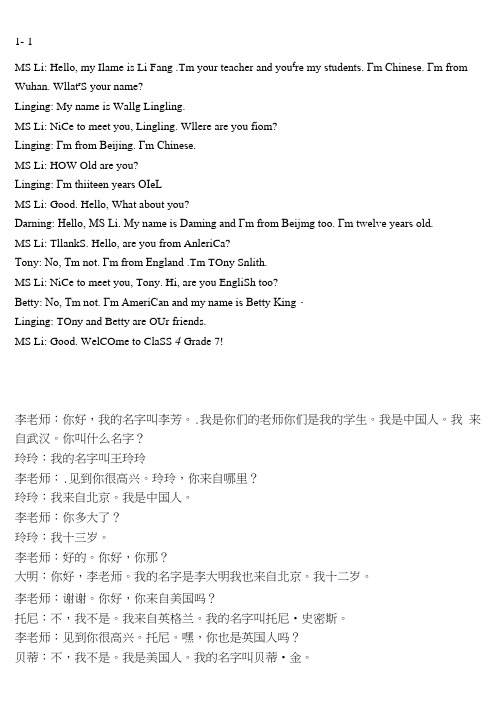
1-1MS Li: Hello, my Ilame is Li Fang .Tm your teacher and you f re my students. Γm Chinese. Γm from Wuhan. Wllat r S your name?Linging: My name is Wallg Lingling.MS Li: NiCe to meet you, Lingling. Wllere are you fiom?Linging: Γm from Beijing. Γm Chinese.MS Li: HOW Old are you?Linging: Γm thiiteen years OIeLMS Li: Good. Hello, What about you?Darning: Hello, MS Li. My name is Daming and Γm from Beijmg too. Γm twelve years old.MS Li: TllankS. Hello, are you from AnleriCa?Tony: No, Tm not. Γm from England .Tm TOny Snlith.MS Li: NiCe to meet you, Tony. Hi, are you EngliSh too?Betty: No, Tm not. Γm AmeriCan and my name is Betty King・Linging: TOny and Betty are OUr friends.MS Li: Good. WelCOme to ClaSS 4 Grade 7!李老师:你好,我的名字叫李芳。
.我是你们的老师你们是我的学生。
我是中国人。
我来自武汉。
你叫什么名字?玲玲:我的名字叫王玲玲李老师:.见到你很高兴。
玲玲,你来自哪里?玲玲:我来自北京。
我是中国人。
2024年秋季新外研版英语七年级上册Starter Unit 1 Get ready课件

Rivew the grammer 名词
一、定义:名词是表示人、事物、地点、抽象概
念等的词。
二、分类
{
可数名词
可数名词是可以计数的单个的物体、
人、想法等名称。它们有复数形式。 如:a book/two books,a girl/three boys.
不可数名词
不可数名词是通常不能看 成单个个体的材料、液体 等的名称。如: water,wool羊毛。
The coats and trousers are very warm because it is cold winter.The blue and red t-shirts are very cool.They looks comfortable.
• Quession 2: What did you do for it?
Uint 1 Get ready Lesson 1
Words and expressions
textbook eห้องสมุดไป่ตู้aser history
geography biology physics
IT information tecnology chemistry
Read and complete .Then listen and check .
Mum: Tomorrow is your first day of junior high school. Are you ready?
Li Ming & Li Meng: Yes, Mum! Mum: Where is your 'S_choo__lb_ag, Li Ming? Li Ming: Here it is. And look at my ² pen_ci_l c_a_se_.
七年级上册英语全册导学案(外研版)

七年级上册英语全册导学案(外研版)七年级上册英语全册导学案(外研版)dule 1 Nie t eet uUnit 1 The first English lessn型:听说[学习目标]1掌握重点单词:eet first English lessn lass student iss telve ear thirteen t fr lse pen ath rite pratise2能够正确使用I’fr…[前预习]读熟单词并能理解意思ath:eetstudent 学生lessn 遇见telve 从……thirteen 也t 十三fr 十二rite 匹配pratise 写ath 练习[堂活动]Step 1检查1)Listen and he h an peple spea1 □2 □3 □2)L at the piture hih rds an u use t desribe the piture?hinese lass father friend ther shl student teaherStep 2 Listening1)Listen and he the true sentenes1iss Li is a teaher □2Lingling is fr Beiing □3 Daing and Lingling are friends □4 Daing and Lingling are English □ang Hui is telve ears ld □2)Listen and fill in the blansiss Li: Hell nae’s iss Li I’a teaher and I’hinese I’____ uhanhat’s ur nae? here are u fr?Lingling: nae’s Lingling I’fr Beiing I’_____ ears ld and I’hinese This is Daing He’s friend e’re studentsDaing: Hell nae’s Daing I’a _______and I’telve ears ld I’fr Beiing Lingling is friend hat’s ur nae?ang Hui: nae’s ang Hui I’______ears ld I’fr Shanghai and I’a student I’hinese I’in lass neiss li: Nie t_____ u, ang Huiang Hui: Nie t eet u, ______Step 3 Read quil and fill in the frNaeAgebituntriss LiLinglingDaingang HuiStep 4 Speaing1、r in pairs As and anserA: hat’s ur nae? B: nae’s…A: here are u fr? B: I’fr…A: Nie t eet u,… B: Nie t eet u ,t2、Intrdue urself t lass Using these ashinese nae is Ni Shihun English nae is harltte I’ an Eng lish teaheru an all e iss /s Ni I’ 39 ears ld I’ fr Beiing, hina I’ hinese I teah in Beiing N80 unir High Shl Gu’re students e’re gd friendsReeber these language pints:1)_ hinese / English nae is…2)_I’ a student 3)_I’ …ears ld 4)_I’ fr…)_I stud in … unir High Shl6)_e’re ur students7)_e’re gd friends, tStep Vabular and prnuniatin(Ativit 6,7,8)1、Listening and repeat (Ativit 6)1)Listen arefull 2)Repeat after the tape2、Listening and repeat (Ativit 7)First,read alud; Then,repeat after the tape总结s在单词末尾的读音。
外研版七年级英语上册同步习题课件:Module 7 Computers Unit1

课堂导学
行为动词一般现在时的特殊疑问句的构成:特 殊疑问词+ do / does +主语+谓语动词原形+其 他?如: When do we have English? 我们什么时候上英语课? What does he often do after school? 他放学后经常做什么?
课堂导学
(7)__H_o_w__d_o__y_o_u_s_e_n_d__e_m__a_il_s_ on the computer? 你如何在电脑上发送邮件? (8)__W_h_e_r_e__d_o_e_s_h_e__w_o_r_k________? 他在哪里工作?
目录 contents
课文理解
课文理解
一、听对话。 听Unit 1 Act.1对话,回答第1~3小题。对话听两 遍。 ( B) 1. Who is asking for help? A. Tony. B. Ms Li. C. Daming.
课文理解
( C ) 2. What’s the last step(步骤)to make the computer work? A. Connect the screen to the computer. B. Connect the keyboard and the mouse to the computer. C. Turn on the computer.
(6)May I get __C___?
A. a paper
B. some papers
C. some paper D. any papers
课堂导学
7. How do I write my homework on the computer?我如何在电脑上写作业? ◆特殊疑问词有:how(怎样),what(什么), when(什么时候),where(在哪里), why(为什么),which(哪一个)
外研版英语七年级上册module1unit

小组合作教学法能够培养学生的合作能力和团队 精神,提高他们的语言运用能力和交际能力。
特点
小组合作教学法注重学生的合作能力和团队精神 ,让学生在小组合作中学习和运用语言。
实施
在小组合作教学法中,教师需要将学生分成若干 小组,设计具有实际意义的合作任务,引导学生 进行小组讨论、合作完成作业等活动,让学生在 小组合作中学习和运用语言。
Insufficient teaching and improvement
教学内容深度不足
反思是否对某些知识点进行了深 入挖掘,是否满足了学生对于深
度学习的需求。
教学方法单一
考虑是否可以引入更多元化的教 学方法,如小组讨论、角色扮演 等,以提高学生的学习参与度和
效果。
教学节奏把控
回顾教学中是否有效地控制了节 奏,避免过快或过慢,确保学生
培养自主学习能力
教师需要培养学生的自主学习能力,鼓励他们通过阅读、听力等途径扩展词汇量,并掌握有效的词汇 学习方法。
Vocabulary learning
01
定期复习与巩固
02
教师需要定期组织复习和巩固活 动,帮助学生加深对词汇的记忆 和理解,同时及时纠正学生在词 汇运用上的错误。
Grammar learning
Situational teaching method
第一季度
第二季度
第三季度
第四季度
定义
情境教学法是一种通过 模拟真实情境来教授语 言的方法。
特点
情境教学法注重创造真 实的语言环境,让学生 在实际情境中学习和运
用语言。
优势
情境教学法能够激发学 生的学习兴趣,提高他 们的语言运用能力和交
际能力。
外研版七年级英语上册StarterModule2MyEnglishlesson教案

外研版七年级英语上册StarterModule2MyEnglishlesson教案Module 2 My English lessonUnit 1 Open your book.Ⅰ. Analysis of the textIn this text students will learn how to recognize objects in the class.Ⅱ. Arrangement of teaching in this moduleThree periods for this module, one per iod for one unit.Ⅲ. Teaching focus1. Master language of asking the name of specific objects in the class, and master the words of objects in the class.K ey vocabulary and phrases: sit, down, sit down, open, book, listen, draw, put, up, hand, stand, stand up, close What’s this in English?, What’s this?, It’s…, instruction pronoun this.2. Be skilled in oral expression of asking the name of specific objects in the class and give corresponding answers.Ⅳ. Teaching aims1. Function: recognition of objects in the class.2. Listening: St udents can understand others’ questions of asking the names of specific objects, and give corresponding answers.3. Speaking: Students can ask and answer objects’ names.4. Reading: Students can understand the similar dialogue of asking and answering obje cts’ names.5. Writing: Students can write the names of objects in the class.Ⅴ. Teaching ProceduresPart I: Lead inStep 1: Review the greeting phrases in the previous period by having the whole class play the dialogue in real situation.Step 2: Ask some students to introduce their partners to the class.Step 3: Enjoy a song: Hello and how are you?Part II: Vocabulary studyStep 1: Show some pictures of objects in the class by PPT, give students the names of the objects.Step 2: Play the recording and have them point out the words and phrases in Activity 1.Step 3: Listen and read.Good morning, class.Good morning, Miss Zhou.Please s it down.Step 4: Play the recor ding and have them point out the words and phrases in Activity 2.Sit down.Open your bookListen.Draw.Put up your hand.Stand up.Close your book.Step 5: Play the recording again and have them read after the tape.Step 6: Listen again and do.Part Ⅲ: Dialogue studyStep 1: Teacher ask the whole class the objects in the PPT’s names.Step 2: Match the expressions in Activity 3.1. Put up a) your book2. Open b) …down3. Stand c)… up4. Sit d)…your hand.Step 3: Check the answers.Keys: 1. d 2. a 3. c 4. bStep 4: Write the letters in Activity 5.Step 5: Listen and check.Step 6: Work in pairs, one student point one object in the PPT, the other answer the question.Step 7: Work in pairs and fill the blanks in Activity 6. Have some of them to perform the dialogue for the whole class.Stand up.Yes.Open your book.Yes.Step 8: Work in pairs. Say and do.Unit 2 What’s your number?Ⅰ. Analysis of the textIn this text students will learn how to express English number.Ⅱ. Arrang ement of teaching in this moduleThree periods for this module, one period for one unit.Ⅲ.Teaching focusKey vocabulary and phrases: student, new, here, in, one, two, three, four, five, six, seven, eight, nine, ten, telephone, number Ⅳ. Teaching aims1. Function: recognition of numbers.2. Listening: Students can understa nd others’ questions of asking numbers, and give corresponding answers.3. Speaking: Students can ask and answer numbers.4. Reading: Students can understand the similar dialogue of asking and answering numbers.5. Writing: Students can write numbers.Ⅴ. Teaching ProceduresPart I: Vocabulary studyStep 1: Learn English number from one to ten.Step 2: Enjoy a song: Ten little Indians.Part II: Listening practice.Step 1: Look at the pictures in Activity 1.Step 2: Listen and read.—Hello. Are you a new student here?—Yes, I am.— What class are you in?—I’m in Class 3. Mr. Chen’s class.Ste p 3: Listen and repeat.one two three four fivesix seven eight nine tenStep 4: Listen and chant.One, two, three, four, five.Once I caught a fish alive.Six, seven, eight, nine, ten,Part III: Dialogue studyStep 1: Ask the students to read the conversation silently.Step 2: Play the recording and ask the students to listen and read the conversation. Step 3: Read the conversation.Step 4: Act it out.Step 5: Language pointsWhat’s your telephone number?What’s your telephone number? 用于询问对方的电话号码,回答时用“It’s +电话号码.”结构。
初中英语外研版七年级上册高效课堂资料M7U1单元测试题试题
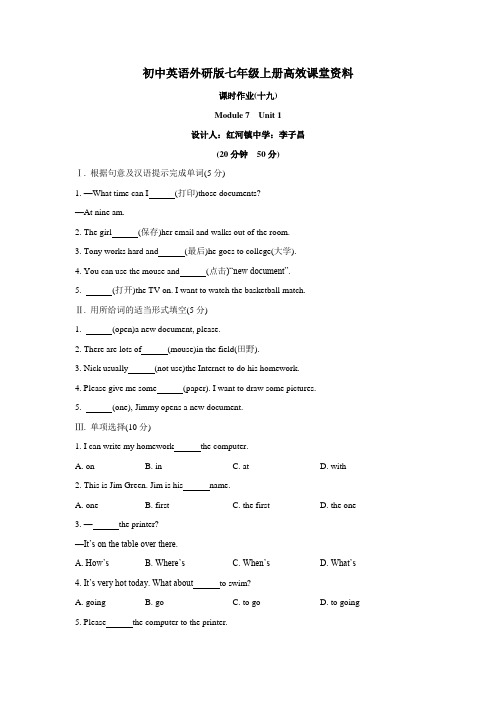
初中英语外研版七年级上册高效课堂资料课时作业(十九)Module 7 Unit 1设计人:红河镇中学:李子昌(20分钟50分)Ⅰ. 根据句意及汉语提示完成单词(5分)1. —What time can I(打印)those documents?—At nine am.2. The girl(保存)her email and walks out of the room.3. Tony works hard and(最后)he goes to college(大学).4. You can use the mouse and(点击)“new document”.5. (打开)the TV on. I want to watch the basketball match.Ⅱ. 用所给词的适当形式填空(5分)1. (open)a new document, please.2. There are lots of(mouse)in the field(田野).3. Nick usually(not use)the Internet to do his homework.4. Please give me some(paper). I want to draw some pictures.5. (one), Jimmy opens a new document.Ⅲ. 单项选择(10分)1. I can write my homework the computer.A. onB. inC. atD. with2. This is Jim Green. Jim is his name.A. oneB. firstC. the firstD. the one3. —the printer?—It’s on the table over there.A. How’sB. Where’sC. When’sD. What’s4. It’s very hot today. What about to swim?A. goingB. goC. to goD. to going5. Please the computer to the printer.A. writeB. printC. connectD. switchⅣ. 完成句子(10分)1. 我经常在电脑上写作业。
外研版七年级上册英语课件:M2 Unit1(共58张PPT)
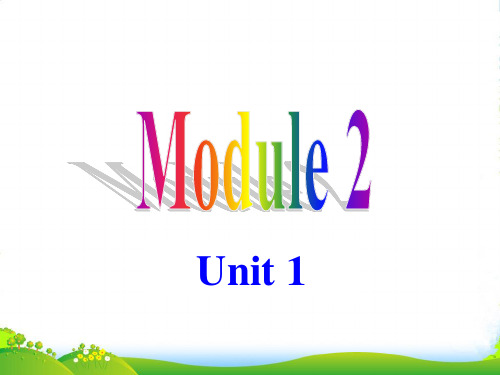
Talk about the family photo.
This is a family photo. This is grandfather. My grandmother is on his right. These are my ... This is the father. This is ... My sister is next to me.
These are dogs.
This is Betty’s mother. This is Betty’s father. These are Betty’s parents.
注意到了吗?
单数 this that it / he / she is
复数 these those
they are
指示代词
•
sister
This is my …
friends
These are my …
There are four pictures of different family. Which one do you want to have a look?
Talk about the family photo.
aunt, uncle, cousin
motheprarefnattshegrrangdrfaanthdgeprraanrednmtsother
bbrroothtbhererortsher
ቤተ መጻሕፍቲ ባይዱ
外研版英语七年级上册Module2 unit1课件

写出下列单词的对应词。
1.father__m_o_t_h_e_r 2. sister_b_r_o_t_h_e_r_ 3. uncle_a_u__n_t _ 4. grandfather__g_ra_n_d_m__o_t_h_e_r
___a_u_n_t_____ .
5. My mother’s brother is my
___u__n_c_l_e____. 6. My mother’s sister is my a_u__n_t_.
目标二:熟读并理解对话
This is a photo of Tony’s family.
学习目标
Module 2
Unit 1
Is this your mum?
总体设计思路
• 1.本节课的课型是一节听说课,训练学生 的听,说能力。
• 2.根据课标要求,本节课的语法项目有两 个,第一是掌握指示代词this,that, these,those的用法,第二是掌握方位介 词的用法。模块任务是学会用指示代词和 方位介词介绍自己的家庭。
I`m... next to ... in front of ... behind... on one`s left... on one`s right...
学习目标
• 1.学习单词词组 • 2.熟读并理解对话,掌握知识点 • ⑴指示代词this,these的用法。 • ⑵表示方位的介词及介词短语 • 3.介绍自己的家庭成员
my__p_a_r_en__ts___.
2. My grandfather and grandmother are my _g_r_a_n_d_p_a_r_e_n_t_s__ .
外研版七年级英语上册 Unit 1 A new start Starting out

1
Complete
the
qcuoemsptiloentena/kirəem. 'pliːt/ v.使完整;完成
Can you completev.your task on time?
你能按时完成你的任务吗?
This is a completaedjfa.ilure. 这是一个彻底的失败。
Unit 1 A new start
Starting out & Understanding ideas
Starting out
1 Guess and match the sentences with the
countries. 教材原图
What do people do on the first day of school?
8 “Well done, Wang Han. In fact /fæ kt/, this is my first lesson for all of you.⑧You are now in junior high
school. Learning will be more difficult. It's important
I 5__p_u_t_______ my hand angd pointed out the mistake.
·Ms Cuphen told us: It's important toth6_i_n_k________ in our
learning.
more
Think and share 1 What is the meaning of the sentence from Confucius? 2 Do you know any famous sayings about learning?
外研版(2024)七年级上册 Unit 1 单元巩固提升

·英语
Plan Your Day A good plan can help a lot.It can help you reduce (减少) stress and plan tasks ahead.Write down your homework and activities in a notebook.Put the most important tasks first.Don’t forget to take short breaks for fun or rest. Be Active Play a sport , go for a walk , or just move around.Exercise is a great way to relax.It helps clear your mind and makes you feel good.
·英语
21. C Start a conversation before the bell rings.You can ask them what kind of music they like,what kind of clubs they often join in and what movies they’ve seen.Maybe you have some similar interests.
A.Walk together. B.Talk about the next class and the teacher. C.Ask about interests. D.Borrow something. E.Get to your bus together. F.Talk to the persons sitting next to you.
初中英语外研版七年级上册《Unit 1 Are you getting ready for Spri
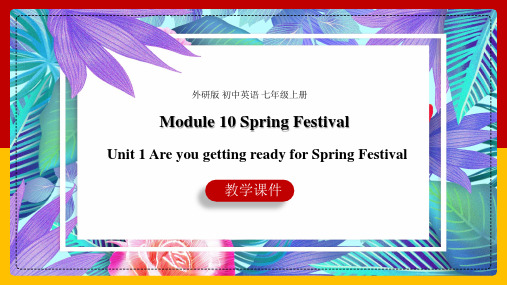
A. they
B. them
C. their
4.--Jim, ________your things away.
A. put
B. putting
C. puts
(202X·广西百色)
--Kitty, I’m busy cooking. Can you give me a hand?
--Mum, just wait a moment. I _______ my bed now. A. make B. will make C. am making D. making
【解析】考核动词的时态。 句意:--姬蒂,我忙于做饭。你能帮我一下吗?
--妈妈,稍等一下。我现在正在整理床铺。 根据答题空所在句中的时间状语为now,可知使用现在进行时态。 再根据现在进行时态的构成:be+动词-ing情势,故选C。
Homework
1.熟记本课词句,分角色朗诵课文。 2.任选本课中显现的一个现在进行时态的句子,
以书写的情势进行句式变换。
外研版 初中英语 七年级上册
非常感谢收看
教学课件
d 5 cooking the meal
What are they doing for Spring Festival?
Name Lingling Grandma Mother
Aunt Daming and
Betty
What are they doing now? making lanterns cooking the meal putting things away sweeping the floor
join加入 (团体/组织/军
队),
或要求某人加入 某种动
T: Can I join them?
外研版七年级上册英语课文
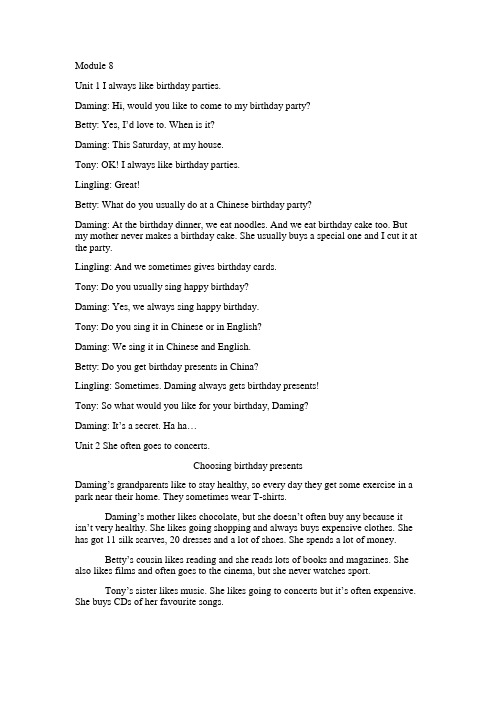
Module 8Unit 1 I always like birthday parties.Daming: Hi, would you like to come to my birthday party?Betty: Yes, I’d love to. When is it?Daming: This Saturday, at my house.Tony: OK! I always like birthday parties.Lingling: Great!Betty: What do you usually do at a Chinese birthday party?Daming: At the birthday dinner, we eat noodles. And we eat birthday cake too. But my mother never makes a birthday cake. She usually buys a special one and I cut it at the party.Lingling: And we sometimes gives birthday cards.Tony: Do you usually sing happy birthday?Daming: Yes, we always sing happy birthday.Tony: Do you sing it in Chinese or in English?Daming: We sing it in Chinese and English.Betty: Do you get birthday presents in China?Lingling: Sometimes. Daming always gets birthday presents!Tony: So what would you like for your birthday, Daming?Daming: It’s a secret. Ha ha…Unit 2 She often goes to concerts.Choosing birthday presentsDaming’s grandparents like to stay healthy, so every day they get some exercise in a park near their home. They sometimes wear T-shirts.Daming’s mother likes chocolate, but she doesn’t often buy any because it isn’t very healthy. She likes going shopping and always buys expensive clothes. She has got 11 silk scarves, 20 dresses and a lot of shoes. She spends a lot of money.Betty’s cousin likes reading and she reads lots of books and magazines. She also likes films and often goes to the cinema, but she never watches sport.Tony’s sister likes music. She likes going to concerts but it’s often expensive. She buys CDs of her favourite songs.Lingling’s aunt and uncle like football, but they don’t go to football matches. They usually watch football on television at weekends. They always like watching AC Milan, but they sometimes watch Manchester United.Module 9Unit 1 We are enjoying the school trip a lot.Betty: Hi, mum!Mum: Hello, Betty! Where are you now?Betty: I’m standing on the Great Wall of China and talking to you.Mum: Really? That’s great.Betty: We’re on a school trip.Mum: What about the others? Are they with you?Betty: Well, right now Tony is eating a delicious ice cream. Wang Hui is taking lot of photos. Lingling is buying a few presents and postcards. They’re on sale at the shop. Daming is having lunch and lying in the sun.Mum: I’d like a postcard too, but please take some photos of the Great Wall and send them to me by email.Betty: OK. We’re enjoying the school trip a lot. Anyway, it’s time to go back to school now. Bye, Mum!Mum: Bye, Betty.Unit 2 They’re waiting for buses or trains.At this moment, in different places of the world, people are doing different things.A In London, it’s five o’clock in the afternoon and people are leaving work and are going home. They’re waiting for buses or trains. Some people are driving home. Some are getting off buses or trains. Some are having afternoon tea at home or having a drink.B In Moscow, it’s eight o’clock in the evening, so people aren’t having afternoon tea. They are having dinner at home or in the restaurant. Some are going to the theatre or watching a film. Some are watching television or playing games at home.C In Beijing, it’s one o’clock at night, so people aren’t having dinner. Most people are still working and some are going home from work.D In Los Angeles, it’s nine o’clock in the morning. People aren’t sleeping. They’re working. Children are starting their lessons.E In New York, it’s twelve o’clock. People aren’t working. They’re having lunch. They are eating hamburgers or hot dogs and drinking coffee or cola. Some people are seeing friends, calling home or shopping.Module 10Unit 1 Are you getting ready for Spring Festival?Tony: Hi, Lingling. This is Tony speaking. What’s happening? Are you getting ready for Spring Festival?LingLing: Yes, we are. We’re quite busy now.Tony: What are you doing at the moment?LingLing: I’m making big red lanterns.Tony: I like them. They are very beautiful. Is your father helping you?LingLing: No, he isn’t. He’s still at work.Tony: What’s your mother doing?LingLing: She’s cleaning the house and pitting things away.Tony: She’s working so hard!LingLing: Yes. My aunt is sweeping the floor, and my grandma is cooking the meal in the kitchen.Tony: What are Daming and Betty doing?LingLing: They’re learning a dragon dance with my grandpa.Tony: Can I join them?LingLing: Of course. Hurry up.Unit 2 My mother’s cleaning our house and sweeping away bad luck.I’m Li Shan from China. Spring Festival is very important in my country. Like Christmas, it happens every year, but not on the same day. It usually comes in February, but sometimes it comes in January. I’ve got some photos of it. Have a look at them.A Here’s the first one! It’s a few days before Spring Festival. My mother’s cleaning our house and sweeping away bad luck. Look at the food on the table! We always buy a lot of food before the festival.B Oh, I love this photo. We are celebrating Spring Festival with a traditional family dinner on the evening before Spring Festival. There is so much delicious food. I am eating jiaozi---a kind of dumpling. After dinner, we usually watch a special programme on TV.C In this photo, my parents and I are visiting my uncles and aunts. We are wearing new sweaters and coat. I always get a hongbao. It means lucky money.。
外研版英语七年级上册Unit1AreyougettingreadyforSpringFestival

一、改写句子1. The stars were beautiful.(改成一般疑问句)________ the stars ________?2. Liu Ming cleans the room every week.(改为一般疑问句)________ Liu Ming ________ the room every week?3. Li Hong danced to disco at the party yesterday.(改为一般疑问句)_____ Li Hong _____ to disco at the party yesterday?4. I can’t play basketball after school, and after dinner, I can’t relax either. (..., and ...either)_________________________________________________________________________________________ 5. She is cleaning the house. (改为一般疑问句,并作否定回答)—________ she ________ the house?—________, ________ ________.二、单项选择6. —Is your brother at home? I want to tell him about our picnic.—Oh, he is out at the moment. Can I ________ a message?A.find B.give C.take D.tell7. —I want to know about Jane’s family. Can you ________ it for me?—OK. His parents are workers and they’re very kind.A.write B.describe C.tell D.follow8. —What are you doing there?—I am ________. Breakfast will be OK soon.A.running B.singing C.sleeping D.cooking9. —I’ve tried hard at my schoolwork but still _________.—Don’t worry. Sometimes losing is only a sign that you really tried. A.failed B.entered C.reached D.happened10. —Can you ________ with me in English? —Sorry, I can’t ________ English. A.speak; talk B.tell; speak C.talk; speak D.say; tell11. Do you want the music club?A.join B.joining C.to joining D.to join12. Sam,can you pass(递) me my glasses? I can ________ see the words in the newspaper.A.hard B.hardly C.really D.clearly13. —Can you ________ it in English?—Yes. I can also ________ English stories if you like to listen to.A.speak; say B.say; tell C.say; speak D.speak; tell14. _______ she works hard, she’ll get good grades.A.If B.Because C.Before D.Though15. My mum is a good ________. The food is yum.A.teacher B.nurse C.doctor D.cook三、句型转换16. My daughter can dance.______________________________17. Could you tell me how I can get to the National Stadium? (同义句转换)______________________________________________________________________________________________ 18. She speaks Chinese very well. (改为否定句)She ________ ________ Chinese very well.19. The students are watching a lion dance in the street. (对画线部分提问)_____________________________________20. The woman always dances and sings.(用never改为否定句)The woman ______ _____ _____ ______.四、单词拼写21. My mother isn’t watching TV at the m________.22. He isn’t good at ________ (跳舞).23. We hope you can ________ (参加) us soon.24. No one knows what will ________ (发生) in 100 years.25. They are ________ (幸运) to take photos with the famous athlete Gu Ailing.五、用所给单词的正确形式填空26. Usually children ______ (not like) vegetables.27. 用括号中所给单词的适当形式填空1. Hurry up!The train is __ (come).2. Black __ (mean)bad luck in China.3. My sister is __ (study)in London now.4. Jack is __ (learn)how to play basketball now.5. I can __ (cook)a lot of delicious food as my mother.6. My mother is __ (wash)clothes at the moment.7. This story is very interesting.I enjoy __ (read)it a lot.8. David's grandma is __ (tell)him a story about David's grandpa.9. —What are you doing?—I'm __ (dance).10. —__ (be)Jane at __ (work)now?—Yes,she is.28. Let’s _______________(celebrate) Thanksgiving Day .29. My mom can ________ (speak) English.30. Who ________ (clean) the blackboard on Thursday?六、完成句子31. 一些大学生总是乐于助人。
- 1、下载文档前请自行甄别文档内容的完整性,平台不提供额外的编辑、内容补充、找答案等附加服务。
- 2、"仅部分预览"的文档,不可在线预览部分如存在完整性等问题,可反馈申请退款(可完整预览的文档不适用该条件!)。
- 3、如文档侵犯您的权益,请联系客服反馈,我们会尽快为您处理(人工客服工作时间:9:00-18:30)。
- I’m 13. / I’m 13 years old.
3. - Where are you from?
be from : 来自
- I am from Pinghu / China.
4. - What class are you in?
- I am in Class Three / Four, Grade Seven.
Learn, watch and do the actions about the words of Activity 8.
listen stand up
practise
(练习)
sit down
read
write
open
close
Thank you for your listening! Goodbye!
2.This is my friend. He is xxx. He is from … This is my friend, too. She is xxx. She is from … That is my book. It is on the desk.
3. We are Chinese.
You are students. be: am, is, are
5. I am a student and I am Chinese.
= I am a student and I am a Chinese boy / girl.
6. - Nice to meet you.
- Nice to meet you, too.
Presentation
1. I am Miss Xiao. I am a teacher. I am Chinese. I am from Pinghu / China. I am 31 years old.
1. Miss Li is a teacher .
✓
2. Lingling is from Beijing .
✓
3. Daming and Lingling are friends . ✓
4. Daming and Lingling are English .
5. Wang Hui is twelve years old .
My name’s Wang Hui . I’m thirteen years old. I’m from Shanghai and I’m a student. I’m Chinese . I’m in Class One.
Listening and vocabulary
1. Listen and check ( ✓) how many
Name Miss Li
Age Job (职业)
City (城市)
/ teacher Wuhan
Country (国家)
China
Lingling
1Daming
12 student Beijing
China
Wang Hui 13 student Shanghai China
people speak.
1.
2. ✓
3.
2. Look at the picture. Which words
can you use to describe it?
Chinese class father friend mother school student teacher
Listen and check (✓) the true sentences.
1. Miss Li is a __t_e_a__c_h_e__r__. She is _C__h_i_n_e_s_e___. 2. Lingling is a _s__t_u_d_e__n_t__. She is a _f_r_i_e_n_d___ of Daming. 3. Daming is from __B__e_i_j_in_g____. He is ___1_2____ years old. 4. Wang Hui is a _s__t_u_d_e__n_t__. He is from__S_h__a_n_g_h__a_i. 5. Miss Li, Lingling and Wang Hui are all __C_h_i_n_e__s_e__. 6. Lingling, Wang Hui and Daming are all__s_t_u_d__e_n_t_s_.
A: What’s your name? B: My name’s … A: Where are you from? B: I’m from … A: How old are you? B: I’m … years old. A: What class are you in? B: I am in … A: Nice to meet you. B: Nice to meet you, too.
Revision
Module 1 Nice to meet you Unit 1 The first English lesson
1. - What is (= What’s) your name?
- My name is … / I am (= I’m) …
2. - How old are you?
They are friends.
I’m Li Ping, and I’m Chinese. I’m from Wuhan.
My name’s Lingling. I’m from Beijing. I’m twelve years old , and I’m Chinese.
Hello. My name’s Daming. I’m a student, and I’m twelve years old. I’m from Beijing.
